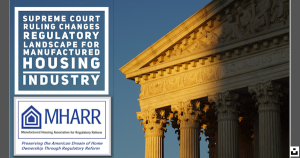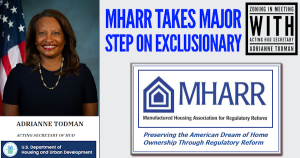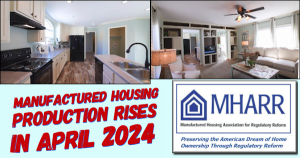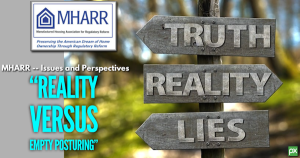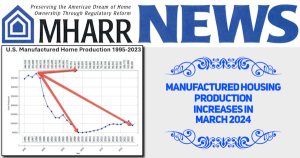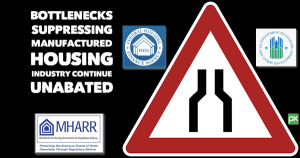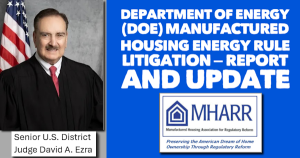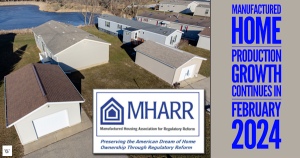MHARR Calls on FHFA To Join Increasing Demands For Congressional Oversight
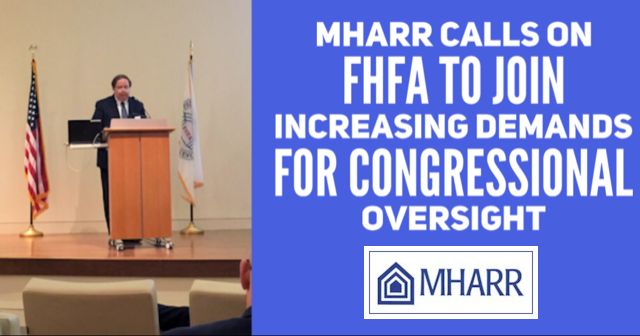
Washington, D.C. December 2, 2019 – The Manufactured Housing Association for Regulatory Reform (MHARR), in public comments (see copy attached) delivered at a Washington, D.C. Duty to Serve Underserved Markets (DTS) “Listening Session” conducted by the Federal Housing Finance Agency (FHFA), has called on FHFA to join the increasing demands for congressional oversight of the Government Sponsored Enterprises’ (GSEs) (i.e., Fannie Mae and Freddie Mac’s) ongoing failure to implement DTS with respect to mainstream HUD Code manufactured housing for moderate and lower-income American families.
In remarks delivered at the December 2, 2019 “Listening Session,” MHARR President and CEO, Mark Weiss, publicly rebuked Fannie Mae, Freddie Mac and their regulator, FHFA, for failing – over the course of more than a decade — to implement DTS at all with respect to the 80% of the mainstream HUD Code manufactured housing market served by personal property or “chattel” loans. This has allowed a less-than-fully-competitive manufactured housing lending market – dominated by higher-cost, captive portfolio lenders affiliated with the industry’s largest corporate conglomerates – to persist, to the detriment of both consumers and the broader manufactured housing industry.
Worse yet, as MHARR noted in its comments, Fannie, Freddie and FHFA have not only defied Congress by failing to implement DTS for the industry’s most affordable mainstream homes – thereby needlessly forcing consumers not otherwise excluded from the market into the higher-cost loans offered by those captive portfolio finance companies – but have simultaneously sought to divert DTS funding to a so-called “new class” of non-mainstream manufactured homes. This name, in and of itself, has an inherently discriminatory and exclusionary connotation. Such higher-cost, non-mainstream “manufactured homes,” moreover – and not surprisingly — are produced primarily by those same corporate conglomerates.
This brazen diversion of DTS outside of the mainstream of HUD Code manufactured housing, combined with the ongoing failure of the GSEs to provide any type of DTS support whatsoever for the vast bulk of the industry’s mainstream homes and homebuyers, has illegitimately and disingenuously transformed the positive and potentially beneficial DTS mandate, as legislated by Congress, into yet another excuse and pretext for continuing discrimination and exclusion by Fannie, Freddie and FHFA against mainstream HUD Code homes, the industry’s smaller, independent homebuilders, and the millions of otherwise credit-worthy moderate and lower-income Americans who rely on affordable, mainstream HUD Code homes.
As emphasized by MHARR, it is both shocking and unconscionable that FHFA – contrary to President Trump’s efforts to advance affordable housing and homeownership – would allow the GSEs to engage in such a blatant diversion from the legitimate goals and objectives of DTS, thereby denying the benefits of homeownership to millions of potential manufactured homebuyers.
MHARR has thus called on FHFA, going forward, to coordinate its regulation of Fannie Mae and Freddie Mac under DTS with the administration’s efforts to promote affordable homeownership by ensuring full, market-significant DTS support for the vast bulk of the existing mainstream manufactured housing market. Beyond that, however, FHFA should join the growing demands for congressional hearings and oversight to clarify and reiterate the fundamental remedial purposes of DTS with respect to mainstream, affordable manufactured housing, and to restore the full promise of DTS for millions of homebuyers that, through no fault of their own, have been shut out of the mainstream manufactured housing market by the GSEs’ ongoing failure to implement DTS.
The Manufactured Housing Association for Regulatory Reform is a Washington, D.C.-based national trade association representing the views and interests of independent producers of federally regulated manufactured housing.

Washington, D.C. December 2, 2019 – The Manufactured Housing Association for Regulatory Reform (MHARR), in public comments (see copy attached) delivered at a Washington, D.C. Duty to Serve Underserved Markets (DTS) “Listening Session” conducted by the Federal Housing Finance Agency (FHFA), has called on FHFA to join the increasing demands for congressional oversight of the Government Sponsored Enterprises’ (GSEs) (i.e., Fannie Mae and Freddie Mac’s) ongoing failure to implement DTS with respect to mainstream HUD Code manufactured housing for moderate and lower-income American families.
In remarks delivered at the December 2, 2019 “Listening Session,” MHARR President and CEO, Mark Weiss, publicly rebuked Fannie Mae, Freddie Mac and their regulator, FHFA, for failing – over the course of more than a decade — to implement DTS at all with respect to the 80% of the mainstream HUD Code manufactured housing market served by personal property or “chattel” loans. This has allowed a less-than-fully-competitive manufactured housing lending market – dominated by higher-cost, captive portfolio lenders affiliated with the industry’s largest corporate conglomerates – to persist, to the detriment of both consumers and the broader manufactured housing industry.
Worse yet, as MHARR noted in its comments, Fannie, Freddie and FHFA have not only defied Congress by failing to implement DTS for the industry’s most affordable mainstream homes – thereby needlessly forcing consumers not otherwise excluded from the market into the higher-cost loans offered by those captive portfolio finance companies – but have simultaneously sought to divert DTS funding to a so-called “new class” of non-mainstream manufactured homes. This name, in and of itself, has an inherently discriminatory and exclusionary connotation. Such higher-cost, non-mainstream “manufactured homes,” moreover – and not surprisingly — are produced primarily by those same corporate conglomerates.
This brazen diversion of DTS outside of the mainstream of HUD Code manufactured housing, combined with the ongoing failure of the GSEs to provide any type of DTS support whatsoever for the vast bulk of the industry’s mainstream homes and homebuyers, has illegitimately and disingenuously transformed the positive and potentially beneficial DTS mandate, as legislated by Congress, into yet another excuse and pretext for continuing discrimination and exclusion by Fannie, Freddie and FHFA against mainstream HUD Code homes, the industry’s smaller, independent homebuilders, and the millions of otherwise credit-worthy moderate and lower-income Americans who rely on affordable, mainstream HUD Code homes.
As emphasized by MHARR, it is both shocking and unconscionable that FHFA – contrary to President Trump’s efforts to advance affordable housing and homeownership – would allow the GSEs to engage in such a blatant diversion from the legitimate goals and objectives of DTS, thereby denying the benefits of homeownership to millions of potential manufactured homebuyers.
MHARR has thus called on FHFA, going forward, to coordinate its regulation of Fannie Mae and Freddie Mac under DTS with the administration’s efforts to promote affordable homeownership by ensuring full, market-significant DTS support for the vast bulk of the existing mainstream manufactured housing market. Beyond that, however, FHFA should join the growing demands for congressional hearings and oversight to clarify and reiterate the fundamental remedial purposes of DTS with respect to mainstream, affordable manufactured housing, and to restore the full promise of DTS for millions of homebuyers that, through no fault of their own, have been shut out of the mainstream manufactured housing market by the GSEs’ ongoing failure to implement DTS.
The Manufactured Housing Association for Regulatory Reform is a Washington, D.C.-based national trade association representing the views and interests of independent producers of federally regulated manufactured housing.




